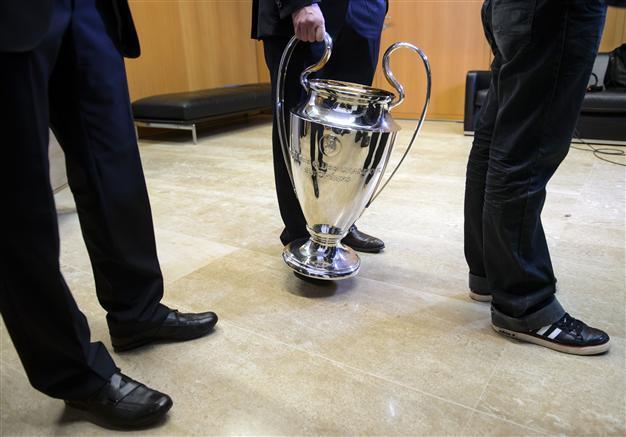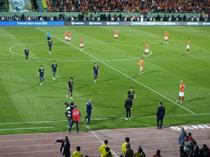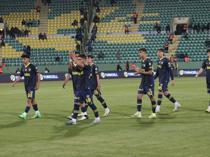Europol smashes match-fixing ring after vast probe
THE HAGUE

A picture taken on December 20, 2012 at the UEFA headquarters in Nyon, shows staff waiting to install the UEFA Champions League trophy after the draw for the last 16 of the UEFA Champions League. AFP photo
A wide-ranging match-fixing investigation has uncovered more than 380 suspicious matches - including World Cup and European Championship qualifiers and two Champions League games - and found evidence that a Singapore-based crime group is closely involved in match-fixing.According to Agence France-Presse, “This is a sad day for European football,” Rob Wainwright, head of the European Union police organization Europol, said today. He said the investigation uncovered “match-fixing activity on a scale we have not seen before.”
At least 425 referees, players and other officials are suspected of involvement, with matches rigged so that major sums of money could be won through betting. Most of the allegedly fixed matches were played in Turkish, German and Swiss championships, but other matches around the world are also concerned.
Two of Europe’s Champions League matches and some World Cup qualifiers are also suspected, Europol said. Europol showed television coverage of a suspect match, an international between Argentina and Bolivia, during which a Hungarian referee awards a highly dubious penalty.
This is not the first time Turkey faces match-fixing allegations.
Last June, 48 football club officials, players and coaches involved in attempting to manipulate matches and form an illegal organization were sentenced to time in jail by a Turkish court following a one-year trial.
Fenerbahçe chairman Aziz Yıldırım, board members Şekip Mosturoğlu and İlhan Ekşioğlu, former Beşiktaş coach Tayfur Havutçu, former Beşiktaş official Serdal Adalı, former Eskişehirspor coach Bülent Uygun, and alleged mob leader Olgun Peker are among the high-profile suspects in the case who were sentenced for attempting to manipulate matches in the 2010-2011 Super League season, when Fenerbahçe won the title, as well as for being members of the aforementioned illegal organization.
Yıldırım, after spending a year behind bars, was sentenced to six years and three months in prison.
The Turkish Football Federation (TFF), however, denied to punish the suspects in the country’s biggest-ever match-fixing trial, arguing that the efforts to fix the games failed.
Istanbul is currently hosting a two-day conference on match-fixing ledby Interpol, along with governing bodies FIFA and UEFA.
Bribes to players, offcials
The latest probe by the Europol uncovered 8 million euros ($10.9 million) in betting profits and 2 million euros ($2.7 million) in bribes to players and officials and has already led to several prosecutions.
Wainwright said the involvement of organized crime “highlights a big problem for the integrity of football in Europe.”
He said a Singapore-based criminal network was involved in the match fixing, spending up to 100,000 euros ($136,500) per match to bribe players and officials.
It was not immediately clear how many of the matches mentioned have been revealed in previous match-fixing investigations in countries including Germany and Italy.
Wainwright and other officials and prosecutors declined to identify any of the suspects, players or matches involved, citing their ongoing investigations.
He said while many fixed matches were already known, the Europol investigation lifted the lid on the widespread involvement or organized crime in rigging games.
“This is the first time we have established substantial evidence that organized crime is now operating in the world of football,” he said.
Wainwright said there is now a “concerted effort” across the football world to tackle the corruption.
















